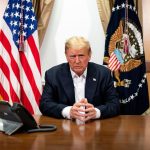President Trump made waves recently by signing an executive order that effectively hits the pause button on enforcing the long-standing Foreign Corrupt Practices Act. This law has been around since 1977, prohibiting American businesses from bribing foreign officials to land or maintain their overseas contracts. Trump’s move, he argues, could open the floodgates for American businesses by leveling the playing field against foreign competitors who often play by a different set of rules.
In a signature Oval Office moment, Trump emphasized that this executive order would translate into “a lot more business for America.” While this might raise eyebrows among those who believe in the rule of law, it’s hard to ignore the potential for American companies to be more competitive in global markets. After all, if countries allow favorable business dealings to slide, shouldn’t American firms get in on the action?
Trump pauses enforcement of law banning bribery of foreign officialshttps://t.co/UgzYW3RnbH pic.twitter.com/FKtr4OJHR4
— The Washington Times (@WashTimes) February 11, 2025
The action halts any current prosecutions under the aforementioned law and directs Attorney General Pam Bondi to draft new enforcement guidelines. The goal? To ensure that American firms can play ball without fear of being penalized for what could be seen as expected business practices abroad. This opens up a more pragmatic discussion about how American companies are often handcuffed by regulations that overseas competitors simply don’t deal with.
Critics have been quick to point out that the law’s original intent was to curb corruption and uphold the rule of law in international business dealings. They argue that loosening these restrictions could foster a culture of corruption that would ultimately hurt American interests. However, the reality is that many foreign countries see nothing wrong in greasing palms to get ahead, so why should American companies be forced to sit on the sidelines while their competitors play rough?
The irony here is rich: a law designed to combat public corruption is now being scrutinized for potentially making American businesses less competitive. With the Justice Department and Securities and Exchange Commission previously filing numerous enforcement actions under this statute, critics worry that this move could open a Pandora’s box of unethical practices. Yet, some may see it simply as a more realistic approach to international business, harkening back to the idea that sometimes, in the dog-eat-dog world of global commerce, one has to play the game to win it.
In a world where so many countries thrive on less-than-reputable business practices, Trump’s bold step could mark a transformative moment in how America approaches foreign business relations. The balance between ethics and competitiveness remains a tightrope walk, but if it ultimately leads to more prosperity for American businesses, then perhaps this controversial shift in policy isn’t as scandalous as some might think.




